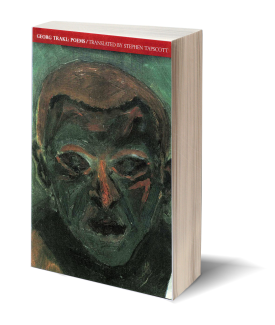|
 |
|---|
Reviewed by Ann Marie Thornburg
Imagine a map that guides by sense and what is palpable instead of by sharp lines of direction. Moving through a Georg Trakl poem is a twilight journey through a region of echoes. We sense darkness over there, we feel color here. The poems are both journey and guide, and, taken together, point toward the hinterlands of the self: the forest where everything blurs, and the field into which it all dissolves. Stephen Tapscott's new translation presents a chronological selection of Trakl's poetry, and the poems, still though they appear, tremble with suggestiveness. Trakl's images (the bell, the deer, the sister) and colors (red, blue, silver) are rendered in unadorned English, grounding the poems' hovering meanings. They are familiar guideposts that grow stranger the more of Trakl's poems one reads; as the poems accumulate, these and other images return time and again as if to tell us, with a soft urgency, that the world we know is pointing us to something beyond what we might perceive in a casual glance at our environment.
In his intelligent and empathic introduction, Tapscott describes Trakl's poetry in this way: "These brisk rich harsh poems have a lot to teach us; they demanded a discipline of him, and they exact a strange disciplined pleasure from their readers, too, a kind of egoless Romanticism we have to silence ourselves to hear." The I in a Trakl poem has stolen away to a place untouchable by our desire for biography and autobiography. But, no matter how absent Trakl may seem in the final product, each of these poems is marked by a familiar subjectivity—both the poet himself and a free-floating onlooker—that reminds us of the human desire to move closer to all the non-human places and creatures in the world. Although things in this world-without-people may not seem to interact with one another, they are perceived in a unified way by the onlooker, and re-animated by him. The poem "Summer" begins in this way:
At evening the cuckoo stops
its crying in the woods.
The wheat bends lower,
the red poppy.
A black storm threatens
over the hill.
The old song of the cricket
fades in the field.
Here "the cuckoo stops its crying," "the wheat bends lower," and "a black storm "threatens." Taken together, these elements of visible reality create the scene of the poem, but they are presented by the speaker as solitary. Each new image is introduced on a different line; they are not consolidated under one verb that forces them to interact with one another. They are self-contained, and their solitude is eerily evocative. Trakl leaves traces of his subjectivity in the verbs, which Tapscott points out often appear late in the syntax of a sentence (a mark of both German grammatical structures and Trakl's own deferral of the subjective presence).
In his introduction, Tapscott presents his reasons for offering this new translation of Trakl's work. The poet's devastating biography has, he argues, caused us to receive and read Trakl as a tragic genius instead of the meticulous and careful artist he was. Trakl presents his trauma, especially in the late poems, but renders it on the page with poetic precision. He lends the chaos of his experience—both in the world and in the mind—a dark order. In his final poem "Grodek," written in the midst of intense personal distress, Trakl calls on his personal image-reserve, using the familiar sights and colors of older poems to express his insistent desperation and sharp warning:
At evening the autumn woods echo
with deadly weapons, the gold plains
and blue lakes the sun rolls
solemnly across.
Here "the autumn woods echo," but not with the cooling sounds of birds. And the bounty and beauty of "the gold plains / and blue lakes" are flattened by sun's fiery momentum. Even before dying soldiers appear in the poem, readers familiar with Trakl will recognize the pieces of a beguiling world, bravely rearranged in the face of a horrific scene.
Still, for all its depressing themes, Tapscott maintains that the tone of Trakl's poetry is varied and rich. It is not the grim tolling of a single bell. He writes: "Too much unrelieved grief and complaint can seem static, but the voice I hear is seldom stalled in a single, lyrical moment." In "Evening in Lans," the speaker meanders through the mysterious image-world of the poem's namesake town, delivering melancholic impressions of the place. But, in the final stanza, Trakl's "sequenced argument-by-image" (as Tapscott calls it) brings the reader to a space of reassurance:
Silver waters flow down forest stairs,
the night, and—speechless—a forgotten life.
Friend: the leaf-covered bridges into the village.
This poem's wisdom is also the source of its sadness. The speaker alludes to a "forgotten life," but of course cannot describe that life in detail because it has been forgotten. This awareness is all the speaker can hope to achieve. The ineffable, which always hovers at the margins of Trakl's poetry, is captured in the "silver waters" that "flow down forest stairs, / the night." Symbolic gestures are preferred to definitive statements since they allow more generously for elusive possibilities. But the poem ultimately points toward the world by giving a nod of gratitude to the bridge that can take both speaker and reader there. It is the bridge, after all, that allows safe passage from the outskirts into the village and back again.
The same could be said of Trakl's poetry which, at its best, facilitates our movement between these two worlds: the human and the non-human, the animate and the inanimate, the effable and the ineffable. When we return to the finite world we live in from the seemingly eternal world of a poem, we sense the far-off in the everyday. Trakl reminds us that he, like all of us, is both a guide and a visitor.
